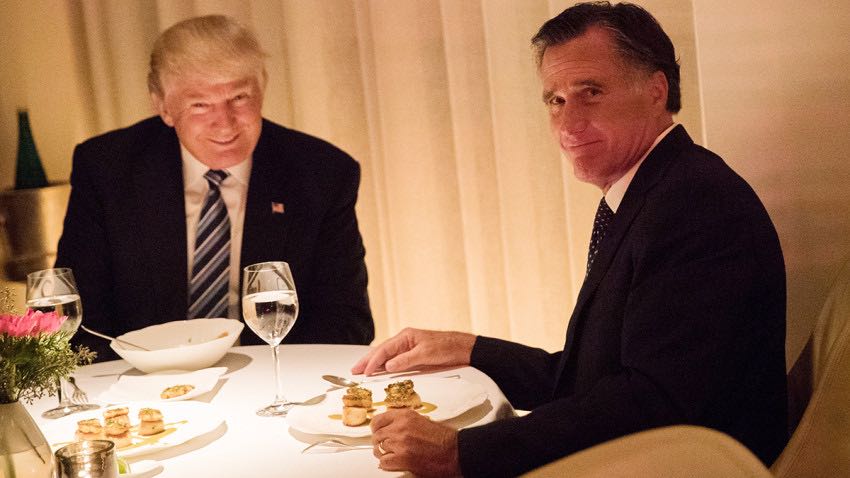Democracy and despotism in a digital age.
Mitt Romney and the “Subjectivized” Conscience

His craven impeachment vote reminds us morality isn’t a matter of "feeling." It’s a matter of truth.
The sainted John Paul II warned against the facile tendency to invoke “conscience” in order to give a cover of the portentous and sacred to things that one just happened to feel strongly about. Conscience, rightly understood, was directed to a set of objective moral truths that rightly claim to govern our acts. It was not to be reduced to matters of merely personal feeling:
[I]n this way [he wrote,] the inescapable claims of truth disappear, yielding their place to a criterion of sincerity, authenticity and ‘being at peace with oneself’, so much so that some have come to adopt a radically subjectivistic conception of moral judgment.
But this is precisely what Mitt Romney has given us. He declared that, with his promise to God and his commitment to his constitutional task, he had “put [his] personal feelings and political biases aside.” And yet, what he offered was just the reverse. An appeal to conscience involves an appeal to standards of moral judgment—standards that can be understood and accepted as true by others as well as oneself. It involves the discipline of giving and testing reasons. In this case that discipline should have encompassed the need to engage the reasons given by his colleagues as they sought to explain why they took this matter seriously and why Mr. Trump’s conduct did not rise to the gravity of an impeachable offense.
If nothing else, collegial courtesy should have been a further spur for Mr. Romney, for his defection left his Republican colleagues open to the charges that their own consciences were not as cultivated to the heights of his own. Or that their reverence for God was but a pale version of his. But instead of engaging their arguments and showing just where they had been wrong, what Romney offered was a plea to respect his judgment most decisively because it was his. As John Paul II anticipated, Romney has avowed his “sincerity” and piety—we might say, his “authenticity.” And on those grounds, most decisively, he implicitly pleaded for the forbearance of colleagues, even as he was inviting the media to raise him above his colleagues to the pedestal of heroism.
Indecent Respectability
Romney had spent long hours with his colleagues listening to the charges against Trump. He had to know the reasons given by his colleagues in turning away those charges as unwarranted, or as far too vague to bear the weight of the indictment. To take a line from the Declaration of Independence, a “decent respect” for the opinions of his colleagues would have obliged him to address the reasons given by those Republican Senators as they rejected the charges. Let’s remind ourselves of how his arguments might be measured when tested in that way.
“The president,” he said, “asked a foreign government to investigate his political rival”:
The president withheld vital military funds from that government to press it to do so. The president delayed funds for an American ally at war with Russian invaders. The president’s purpose was personal and political. Accordingly, the president is guilty of an appalling abuse of public trust.
But as the President’s defenders had pointed out, those funds had not been withheld. And what did it mean to say that we were dealing with “an American ally at war with Russia”? Had we become a co-belligerent in a war with Russia? Surely, no judgment of that kind had been settled yet, either in Congress or the Executive. If this was a test of a vital interest in national security, then the truer dereliction came with the Obama Administration, which had declined to furnish weapons to the Ukrainians. Was the charge that the President had sought the help of a foreign power to aid his political interest in re-election? That sense of the offense would surely have covered Barack Obama, sending a plea to Putin to hold back and give him more space, free of troubles, until he was safely reelected.
Romney acknowledged that no crime had been committed, that Mr. Trump had violated no law. But part of Romney’s novelty—and his large moral sensibility here—was his willingness finally to accept the notion that “a president can indeed commit acts against the public trust that are so egregious that while they’re not statutory crimes, they would demand removal from office.” It is passing strange, in this respect, that as Romney sought to deepen his argument against Trump in this way, he felt obliged to cast a comparable reproach on Joe Biden. Had Biden really been unaware that his son was receiving an exorbitant compensation from a company under investigation in the Ukraine? “While ignoring a conflict of interest is not a crime,” said Romney, “it is surely very wrong.” And a wrong committed by a man in high office, affecting a country besieged by the Russians. Should Biden not come under the same judgment then leveled against Trump? To take Romney’s line, Biden had not committed a crime, but he had done something seriously wrong. His private interests with his family had profited because of the office he had held. Would the implication not have arisen, then, that Biden’s conduct would have warranted his own impeachment at the time? And if so, would that not have formed a nice balancing of the equities: Romney could have accompanied his judgment against Trump with the declaration that the same adverse judgment would have been amply warranted for Joe Biden as well. Had that point been made explicit, would Romney have been toasted in the same way on CNN, ABC, NBC, and MSNBC?
Precedents and Principles
But what was that thing so “egregious” that it called for the removal of an elected president? The use of public authority to serve merely private interests has been a classic definition of “corruption” since Aristotle’s first primer on Politics. But the American Founders also understood, as Madison said, that if men were angels, there would be no need for government. The Founders understood that the government would be run by flawed, forked creatures like themselves. They took human nature as they found it. But the genius of their scheme was to make self-interest work toward larger, better ends. As Madison put in the Federalist #51, the hope was to connect the interests of the man with the interests of the place: it was a scheme of “supplying, by opposite and rival interests, the defect of better motives…that the private interest of every individual may be a sentinel over the public rights.” The personal interest of a President in protecting himself would work to safeguard the powers of the presidential office. And yes, Mr. Trump’s less exalted interest in embarrassing his political enemies could indeed work to probe seriously the kind of corruption that truly does mark the misuse of high office in the case of a former Vice President, seeking office even higher yet.
But even beyond these reckonings, Mr. Romney surely must have known that the precedents in this regard were far more damning. We need think here of FDR telling his Secretary of the Treasury, Henry Morgenthau, that he wanted Moe Annenberg “for lunch.” He wanted, that is, the full ferocity of the IRS focused on the owner of a newspaper in Pennsylvania who happened to be one of the President’s fiercest critics. The family that would later give to the University of Pennsylvania its Annenberg School of Journalism would see their paterfamilias sent to prison. And we may think here also of Thomas Jefferson, urging his allies in Pennsylvania to make vigorous use of the laws on seditious libel to silence his critics in that State. (Jefferson’s vaunted opposition to the Alien and Sedition Acts was an opposition only to a federal law on sedition. But using the levers of office to reward his friends and punish his critics, was not anything foreclosed in his democratic ethic.)
For Mr. Romney there was a striking want of imagination on the matter of the precedents coming into play here. Nor did he show much sense of what principles would be established in settling this judgment on impeachment. A little over 20 years ago Bill Bennett and I did a piece for the Wall Street Journal, posing the question of whether the Democrats would respect, in the case of Bill Clinton, the same standards they had laid down for the impeachment of Richard Nixon. Mr. Nixon was impeached, in one charge, for “suborning perjury.” That was the moral dimension of “precedent”: were legislators or judges willing to live under the laws they had laid down for others? The evidence was mounting at the time that Mr. Clinton surely had suborned perjury. As Professor Jonathan Turley has pointed out, that case would have been confirmed quite clearly and inescapably if Monica Lewinsky had been called to testify during Clinton’s trial in the Senate. But it was clear to us all at the time that the Democrats then, as now, had no inclination to honor the precedents they had created, or apply, to a President of their own, a standard they were all too ready to unfurl against a Republican President.
That sense of things was even more surely on display with the Democrats in the House this year. And that was the decisive point that should have cleared the minds of the Republicans. We do not write on a clean moral slate. The gravity of the misstep here by Trump should have been gauged, in equity, by the precedents of what we have experienced, and the sense of where exactly this misdeed was to be placed in the scale of things we have weighed and judged in the past. The Republicans had been delivered an indictment, as it were, as contrived as a Monty Python version of the Spanish Inquisition. It came without even the rudiments of what counts as the rule of law: charges leveled, but with no right of the accused to know and confront his accuser, with no right to call witnesses of his own or to have his counsel cross-examine the witnesses against him. If the world were rightly arranged, Senators with any decent moral sensibility would have delivered a summary judgment to dismiss the indictment, and invite the House to rise to a level of seriousness.
No Apology?
As for Mitt Romney, he owes his colleagues a deep apology for acting out a gesture that cued the media to impugn their integrity. He did not give them even the minimal courtesy of offering the reasons to explain what was wanting in the judgments they had made with as much strain, and reflection as he was able to summon. Several of his colleagues, running for office this year, have been burdened now with the impression he has cast: that they did not rise to his level of moral fitness. Of course, those are the concerns that would have occurred to him sharply if he had brought to the case an awareness of how this judgment affected others well as himself, with his own standing. But that was the concern he had thrown over, along with the discipline of giving reasons. For this was a judgment, from beginning to end, of a man absorbed in himself.
The American Mind presents a range of perspectives. Views are writers’ own and do not necessarily represent those of The Claremont Institute.
The American Mind is a publication of the Claremont Institute, a non-profit 501(c)(3) organization, dedicated to restoring the principles of the American Founding to their rightful, preeminent authority in our national life. Interested in supporting our work? Gifts to the Claremont Institute are tax-deductible.
In 2010, Claremont Institute Senior Fellow Angelo Codevilla reintroduced the notion of "the ruling class" back into American popular discourse. In 2017, he described contemporary American politics as a "cold civil war." Now he applies the "logic of revolution" to our current political scene.
Claremont Institute Senior Fellow John Marini is one of the few experts on American Government who understood the rise of Trump from the beginning of the 2016 election cycle. Now he looks to the fundamental question that Trump's presidency raises: is the legitimacy of our political system based on the authority of the American people and the American nation-state, or the authority of experts and their technical knowledge in the service of "progress"?




